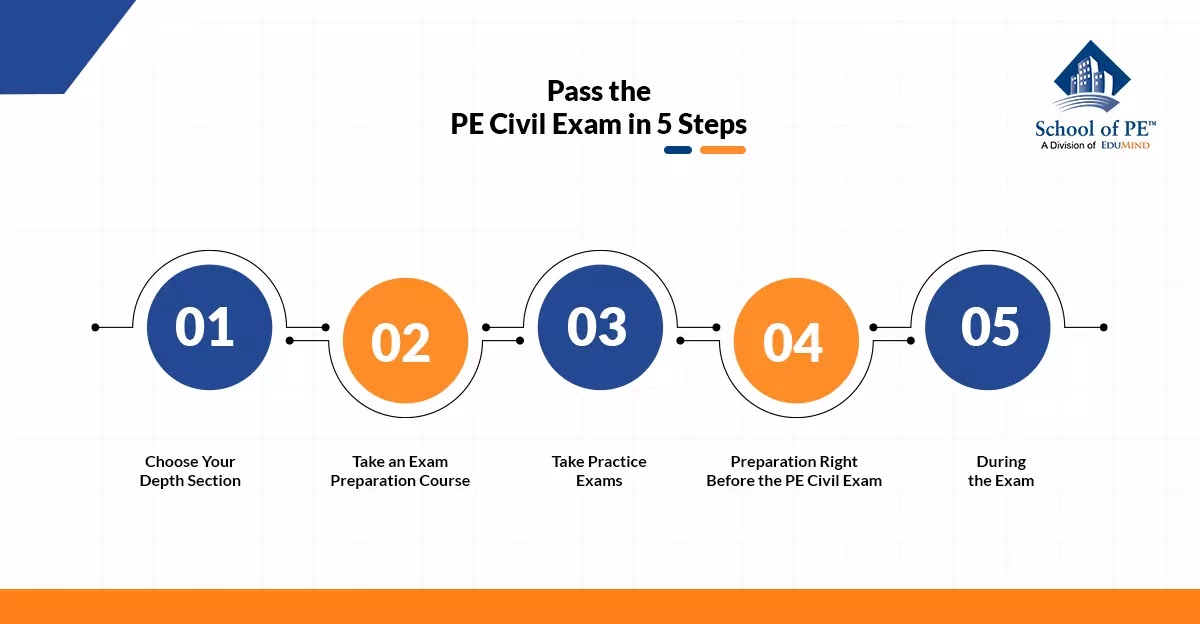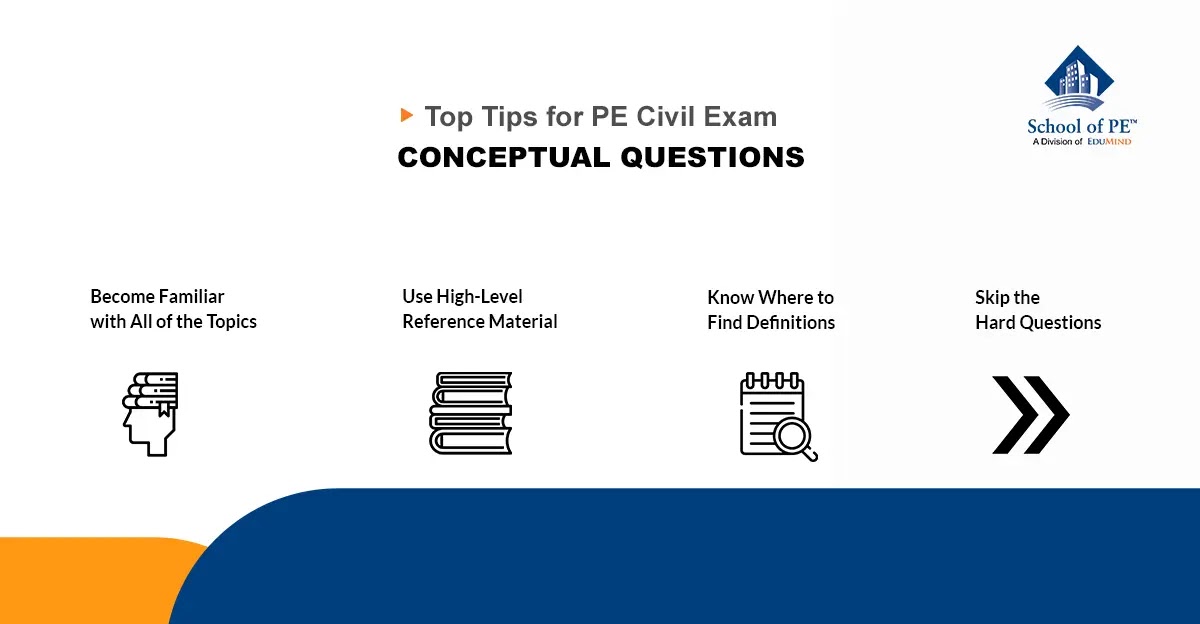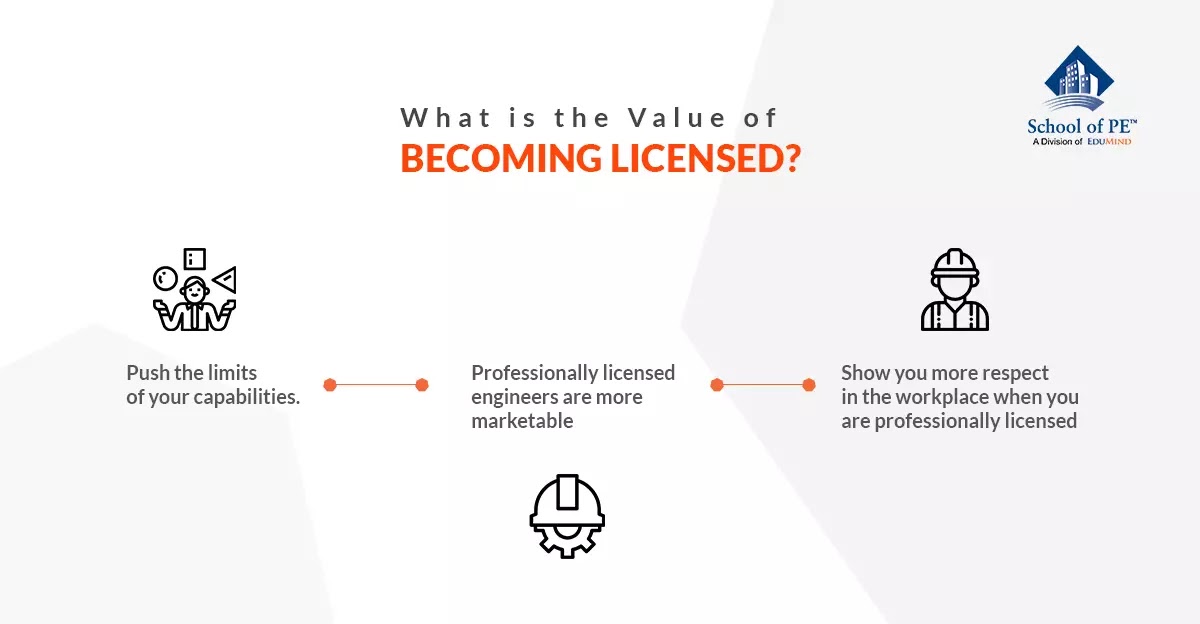
Friday, 27 August 2021
Is it Worth it to Take a PE Civil Course Online?
I would argue that preparing for the PE Civil exam impacts your success far more than any other factor. I spent hundreds of hours in preparation and only eight hours answering questions on exam day. One of the best ways to prepare for the PE Civil exam is with a prep course. In today's busy world, especially with more people working remotely, the option to take an online prep course is appealing. These online courses usually come in two formats: OnDemand or Live Online.
The format I chose for myself was OnDemand. OnDemand courses include pre-recorded videos and review material that you can access anytime based on your schedule. I was able to complete my OnDemand course in the mornings before work, in the evenings after work, and on weekends. One benefit of these courses is the ability to work through the course at times that work for you. One disadvantage is that you are not able to ask questions live during the lectures. Luckily, School of PE provides the ability for OnDemand students to send questions to their instructors through their Study Hub; their instructors will respond within one week to any submitted questions. Another disadvantage, specifically for those who may struggle with time management, is that you must be proactive and disciplined during the course. You are responsible for holding yourself accountable. As a way to help OnDemand students, however, School of PE designed and created a Personalized Study Plan program to help keep them on track.

Live Online prep courses, in comparison, are on a set schedule. You must attend the course at predetermined times, although recordings are also typically made available for discretionary viewing. These courses are great for those who need the added benefit of a distinct structure. You will also have the opportunity to ask your instructors live questions during the lectures. The Live Online format may be harder for those who have busy or irregular schedules, have family commitments, or who have conflicts with the predetermined lecture times.
Regardless of which format you choose, a PE Civil prep course is extremely valuable to exam preparation. The School of PE OnDemand course I took helped me re-learn and review the topics I had forgotten since school, never learned in school, or just wasn't proficient in. The course not only did a great job of helping me gain familiarity with the reference material I used on the exam but also provided concise and easy-to-understand reference material I was able to take into the exam. Their instructors were knowledgeable and skilled at teaching. These characteristics are probably similar to most in-person prep courses, but what set the online course apart was the ability to go back and watch lectures again on topics for which I needed additional preparation. I re-watched numerous lectures for several topics both before and after I took practice exams. I have no doubt that this supplemental lecture-watching made a big difference during the exam.
Online prep courses are an effective way to study and prepare for the exam on your schedule without commuting. They are also much more valuable for many people than simply reading the reference material. Your time is valuable and limited; gaining an idea of what to study for the exam is a smart investment to make. Online prep courses provide that value and much more. I highly recommend taking an online prep course for the PE Civil exam.
Friday, 20 August 2021
Pass the PE Civil Exam in 5 Steps
Qualifying for, taking, and passing the PE Civil exam is a milestone in any civil engineer's career. Below are five steps to passing the PE Civil exam.
Table of Contents
1. Choose Your Depth Section
The PE Civil exam is made up of two sections: the breadth section and the depth section. Everyone taking the PE Civil exam will have similar questions and topics covered for the breadth section. These topics will include structural, water resources and environmental, geotechnical, transportation, and construction. The depth section focuses on specifically one of these topics. Questions for the depth section will generally take more time to solve and will require deeper analysis.
Choosing the right depth section is important, as the questions will make up half of the exam. People often ask which depth section is the easiest to pass, or which section requires the fewest reference books. My advice, and what I did, is to choose the topic that you are most familiar with. This topic could either be what your focus was in school or what your career has focused on since school.

2. Take an Exam Preparation Course
Probably the single most valuable preparation strategy I followed was investing a lot of time in a prep course. I chose an OnDemand course with School of PE and was able to work through the course at home and at work, all while on my own schedule. It is not enough to just simply try to get through the course. Instead, set aside and invest plenty of time to go through the lessons, mark and tab your reference material, work through practice problems, and then go back to focus on any areas in which you're lacking confidence.
I recommend procuring the recommended reference material early in the course or even before it starts. This will allow you to get familiar with the resources you'll use during the exam. I also recommend printing, binding, and marking any reference material the prep course provides, such as PDFs on individual topics. Make sure to follow exam requirements for taking in your own reference material including how it is bound, what it contains, etc.
3. Take Practice Exams
I recommend taking at least two or three practice exams after you complete the prep course. Follow the same schedule and setup that you will have at the exam. Find a quiet room where you won't be disturbed. Only make available what you will have on the exam. Treat the practice exam like the real thing.
After your practice exams, score your work to get an idea of your strengths and weaknesses, as well as what you can expect as far as difficulty and time required to solve problems. Go back and brush up on the areas that still need work!
4. Preparation Right Before the PE Civil Exam
As the exam date approaches, start preparing for the big day. Gather all the reference materials, two approved calculators (you don't want to find out your only calculator doesn't work during the exam), required identification, your exam registration paperwork, earplugs (some exam sites are not as quiet as you would hope), an approved watch (you might not be able to see a clock), and other approved items you might want.
Because you will need to get to the exam site early in the morning, decide if you want to spend the night before the exam near the exam site. This will allow you to hopefully get a good night's sleep and not have to worry about a long commute and traffic the morning of the exam.
5. During the Exam
Once the exam begins, I highly recommend a strategy for choosing which questions to answer first. My strategy was to briefly read through all the questions, marking them one through four. Number one questions were the quickest to solve (usually conceptual questions that I already knew the right answer to), and number four questions were those that would take the most time to solve. I started with all the number one questions, worked my way through two, three, and four. Even if you run out of time, following this strategy will maximize the number of questions you can confidently answer.
Keep track of time as you work through the questions. As you get near the end of the time for the breadth and depth sections, make sure you answer all of the questions. You aren't penalized for wrong answers, so make sure you mark something for each question before time runs out.
These five steps should provide some guidance to your PE Civil exam preparation efforts! Good luck!Friday, 13 August 2021
Top Tips for PE Civil Exam Conceptual Questions
The PE Civil exam is divided into two sessions: the breadth session and the depth session. Everyone who takes the PE Civil exam has similar questions which cover the same topics for the breadth session. You get to choose which depth topic you are tested on. Topics include geotechnical, transportation, water resources, and environmental, structural, and construction.
Conceptual questions are those that don't need to be solved with many if any, calculations. The questions are meant to test if you have a good understanding of the topic. You can usually complete them quickly if you're familiar with the topic but may struggle more if you are not familiar. Most conceptual questions will be in the breadth session, but the depth session will also have some. Here are some tips for successfully answering the conceptual questions.
1. Become Familiar with All of the Topics
Becoming familiar with every topic on the PE Civil exam doesn't mean you need to be an expert on everything. It means that you need to have a general understanding of each topic. Things like knowing the difference between clay and sand and knowing what a critical path construction schedule is will help you a lot when answering conceptual questions.
2. Use High-Level Reference Material
For the pencil-and-paper exam, you're going to take a lot of books into the exam with you. Knowing where to find information quickly is valuable. Many prep courses provide high-level reference material which is great for answering conceptual questions. These references don't go into the theory or in-depth equations for how to solve problems, but they provide a general understanding of topics. Often the answers to conceptual questions can be found quickly in these types of reference materials.

3. Know Where to Find Definitions
Because civil engineering is such a broad discipline, many terms may be foreign to you if you aren't familiar with a specific focus. I recommend taking a civil engineering dictionary with you to the exam. I took a construction dictionary to my exam which defined construction terms that I wasn't necessarily familiar with. Once I understood the terms used in the question, I was usually able to answer the conceptual questions easily and efficiently. Without understanding what the question was asking, I would have needed to spend unnecessary time looking for the right answer or simply guess.
4. Skip the Hard Questions
Time management is very important; spending too much time on a question early in the exam can cause you to run out of time and not answer easier questions. If you are struggling with a conceptual question, read it again and move on. This will allow your mind to still process the concept while you're answering other questions. You may find that by going back to the question later, you know the answer or can at least eliminate answers you know are not correct.
Remember that every question is weighted the same, and you are not penalized for wrong answers. Make sure that before time runs out, you mark an answer for each question.
With these tips, you will be able to successfully answer many or all of the conceptual questions.
Friday, 6 August 2021
What is the Value of Becoming Licensed?
An individual who obtains his or her professional engineering license may gain the following benefits:
1. Earning a PE license shows that an engineer can push the limits of his or her capabilities. Earning licensure and keeping that license current demonstrates that one desires to be challenged and shows motivation to reach the next level. A license expresses inspiration in a specific field of engineering, and that the individual places value on setting and achieving professional goals. Obtaining your PE license may prove to an employer that you will want to experience career growth during your time of employment. Some engineers do not-and will never-achieve the status of a licensed professional engineer. If you want to stand out from the crowd, a professional license is a must-have credential.
2. Professionally licensed engineers are more marketable for various reasons, such as knowledge or experience in a particular area of work, capabilities or demonstrated perseverance, and value in project financials, to name a few. Licensed engineers normally hold themselves to a higher standard than others-most likely because licensed engineers are liable. Workplace liability shouldn't be something to be afraid of, but the awareness of that liability is what can make licensed engineers more valuable in the workplace.

3. Many industry workers and professionals will show you more respect in the workplace when you are professionally licensed. You read that correctly: respect is personally one of the biggest reasons why I chose to become a professionally licensed engineer. Transitioning from an educational atmosphere to an industrial work setting can be more of a shock than some of us may expect. Non-licensed engineers may or may not be fortunate enough to be part of a high-functioning team environment where respect is an issue. However, once you are a professionally licensed engineer, most professionals and non-professionals alike will recognize both your merits and accomplishments.
These three reasons alone were enough for me to buckle down and dedicate a few months of studying and time to prepare, make temporary changes to my personal life, and gather the required materials to obtain my PE license. I have maintained my professional engineering licensure for the past three years and I can confidently say that earning this license helped propel my career forward. I highly recommend pursuing professional engineering licensure for the potential benefits it could bring to your own career!
About the Author: Lucas Mignogna
Luke has 7 years of industry experience comprised of environmental engineering, coal mining operations, and construction engineering roles. Duties have included engineering for upper-level management on client-based projects in shale gas services, coordination of underground coal mining operation projects with Consol Energy, field construction engineering / turnover coordinating roles focused on construction management of an NGL terminal facility and an API manufacturing facility with Fluor, and QC management of five construction/remediation projects with CAPE Environmental.
Subscribe to:
Comments
(
Atom
)